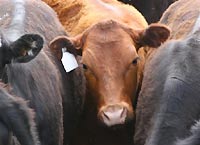UK medics announce negative results for foot-and-mouth disease tests
It turns out that the two new outbreaks of mad cow disease in Britain have become false. UK's chief veterinary officer, Debby Reynolds, stated that the tests on the sites in Kent and Surrey, where the outbreaks had been originally found, returned negative results.

The UK 's chief veterinary officer, Debby Reynolds, said initial tests on the sites in Kent and Surrey returned negative results.
A 3km temporary control zone was imposed around the farm in the Romney Marsh area of Kent yesterday, after the farmer reported suspicious lesions on his calves, reports RTE.ie.
A total of 576 animals have been culled since the foot-and- mouth outbreak began Aug. 3 at a farm in Surrey. The disease was confirmed at a second Surrey farm Aug. 7. A 10-kilometer (6-mile) surveillance zone was still in place today around the infected farms, preventing the shipment of animals in or out. The U.K. has banned exports of all livestock, fresh meat and milk products and halted most movement of cattle, sheep and pigs.
"In light of the assessment today of the very low risk of disease spread outside the surveillance zone we have agreed a set of changes to movement restrictions designed to alleviate the most acute welfare problems," Reynolds said.
The industry has been losing about 10 million pounds ($20 million) a week, according to the Meat and Livestock Commission. In 2001, an outbreak of foot-and-mouth disease led to the culling of 10 million cattle and cost the U.K. economy 10 billion pounds.
Chessington's zoo is home to almost 100 species, many of them endangered. Areas housing its hoofed animals were closed as soon as the original outbreak in Surrey was confirmed, while the rest of the park has remained open, spokeswoman Maria Hamilton said in a telephone interview, reports Bloomberg.
An independent epidemiology report last Friday concluded it was "very highly likely" the source of the disease was the Pirbright research complex shared by the government-funded Institute for Animal Health and the pharmaceutical company Merial.
Both Pirbright laboratories were working on the foot and mouth strain found at the site of the first outbreak. Merial was producing it in large quantities for vaccines while the IAH was using small amounts for research.
Both laboratories have insisted their biosecurity measures are robust, Guardian Unlimited reports.
Source: Agencies
Subscribe to Pravda.Ru Telegram channel, Facebook, RSS!


